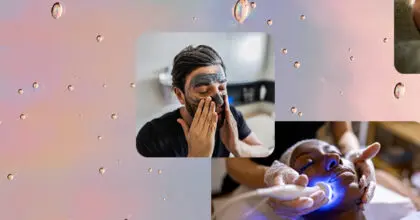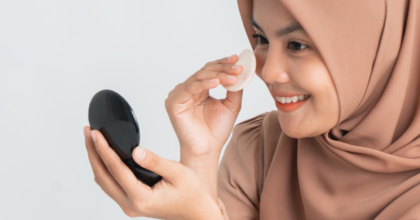Facial masking is creating a selfie moment in the US
Whether first thing in the morning or just before bed, skincare routines are typically saved for the comfort of your own home. Unless of course, you’re among the one in five (20%) American skincare users who view facial masking as an opportunity to snap a selfie, rising to nearly half (45%) of social media savvy skincare users aged 18-24, according to new research from Mintel.
50% of skincare users aged 18-24 agree that facial masks are fun.
With no shame in showing off their skincare routines online, many consumers consider masking an activity to do with friends, including more than one quarter (27%) of skincare users overall and nearly half (47%) of those aged 18-24. The reason behind the more social aspects of masking may be because consumers agree that facial masks are fun with three in 10 (31%) skincare users in agreement, increasing to half (50%) of those aged 18-24. Photos and fun aside, across age groups, skincare users are most likely to agree that facial masks are a good way to pamper themselves (39%).
“Skincare has traditionally been a functional category, but interest in using facial masks with friends or posting photos on social media has given the industry a much-needed facelift. Social media is changing the way skincare is perceived, with consumers not only posting selfies before, during and after their routine, but artistic photos of skincare products arranged in their medicine cabinet or on a vanity,” said Alison Gaither, Beauty and Personal Care Analyst at Mintel. “By adding an element of fun to skincare and positioning products to be shared on social media, brands have an opportunity to not only engage younger consumers, but to also develop brand loyalty that could persuade them to try more products from the line in order to increase sales growth.”
While staples such as lip balm (57%), facial moisturizer (51%) and facial cleanser (46%) are the most likely skincare products to earn a spot on consumers’ bathroom countertop, beauty and personal care brands have an opportunity to boost interest in more specialized treatments through growing interest in new and innovative skincare devices. Mintel research shows that half (49%) of skincare users would be interested in a smart mirror that tells them what skincare they need that day, while two in four (39%) would like to try a skin-scanner attached to their phone that recommends products.
Beyond new technology that makes product recommendations, skincare consumers are also interested in technology that addresses specific skin concerns such as devices that use micro currents to firm skin (47%), lasers to smooth skin (43%), light therapy masks that treat acne (40%) or derma rollers (39%).
“Customizing routines and products is a growing trend in beauty; and skincare is no exception, with new technology, such as smart mirrors and skin scanners, increasing consumers’ ability to personalize their skincare regimens. As technology and beauty become more and more intertwined, we’ll see consumers begin to rely on devices to recommend products on a daily basis, as highlighted in Mintel’s 2025 Global Beauty & Personal Care Trend ‘Augmented Human.’ This could bode well for the specialty treatments segment as these technologies encourage usage of more personalized products,” continued Gaither.
60% of female skincare users prefer to use a makeup remover before they wash their face.
Although seven in 10 (71%) skincare consumers say they use a facial cleanser daily, many feel just one product isn’t enough to fully cleanse the skin. In fact, more than one quarter (28%) of female skincare users agree that cleansers don’t always remove all traces of makeup. This is leading the majority to supplement their routines to ensure their skin is makeup-free as 60% prefer to use a makeup remover before they wash their face.
All in all, facial cleansers (33% market share) are making the biggest splash in the market, growing 31% in the last two years to reach $2.3 billion in retail sales in 2017. Growth is expected to continue through 2018, with sales forecast to grow 6.3% to reach $2.5 billion in 2018.
However, sales of more specialized products are falling behind, including facial anti-aging (-5.5%) and acne treatments (-5.1%). What’s more, as multi-benefit products with whitening claims make the need for separate fade/bleach purchases less essential, total retail sales of fade/bleach declined 19.3% in the last two years to reach $107 million.
Overall, total US sales of facial skincare and anti-aging products are forecast to grow 1.1% to reach $7.2 billion in 2018.
“The facial skincare market continues to post positive gains, though growth has been slow in the last several years. Skincare staples remain key category drivers, but recent shifts toward multi-benefit products are encouraging consumers to trade up, where they are willing to spend more money for fewer products that address multiple concerns. However, as interest in multitasking products continues to grow, as well as innovations in the cleansing segment such as micellar waters and cleansing sticks, sales of specialty treatments will suffer. Looking at the specialty products segment going forward, there is opportunity for brands to educate consumers on the benefits of using specialty treatments in combination with their skincare staples as a better defense against and treatment of skin concerns in order to maintain or increase usage of these products,” concluded Gaither.
Press copies of Mintel’s Facial Skincare and Anti-Aging US 2018 report and interviews with Alison Gaither, Beauty and Personal Care Analyst, are available on request from the press office.
For the latest in consumer and industry news, top trends and market perspectives, stay tuned to Mintel News featuring commentary from Mintel’s team of global category analysts.
-
 Discover your next big breakthroughGet smart fast with our exclusive market research reports, delivering the latest data, innovation, trends and strategic recommendations....View Reports
Discover your next big breakthroughGet smart fast with our exclusive market research reports, delivering the latest data, innovation, trends and strategic recommendations....View Reports -
2026 Global PredictionsOur Predictions go beyond traditional trend analysis. Download to get the predictive intelligence and strategic framework to shape the future of your industry in 2026 and beyond. ...Download now
-
Are you after more tailored solutions to help drive Consumer Demand, Market Expansion or Innovation Strategy?Ask for a customised strategic solution from Mintel Consulting today....Find out more






























